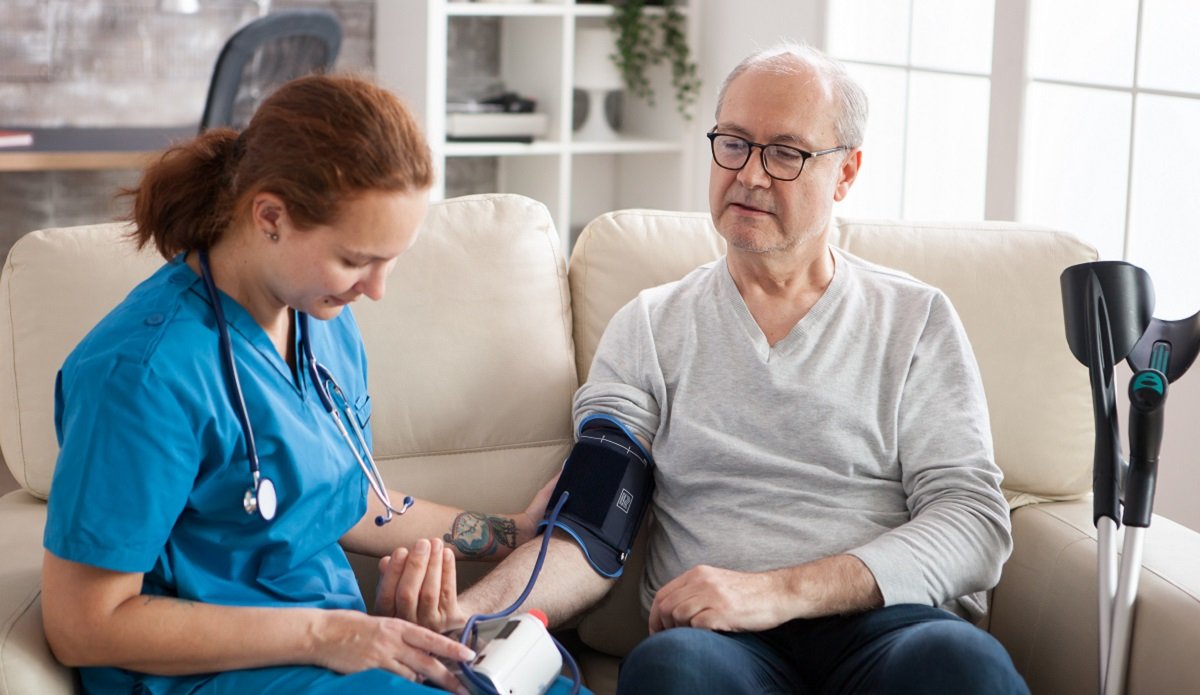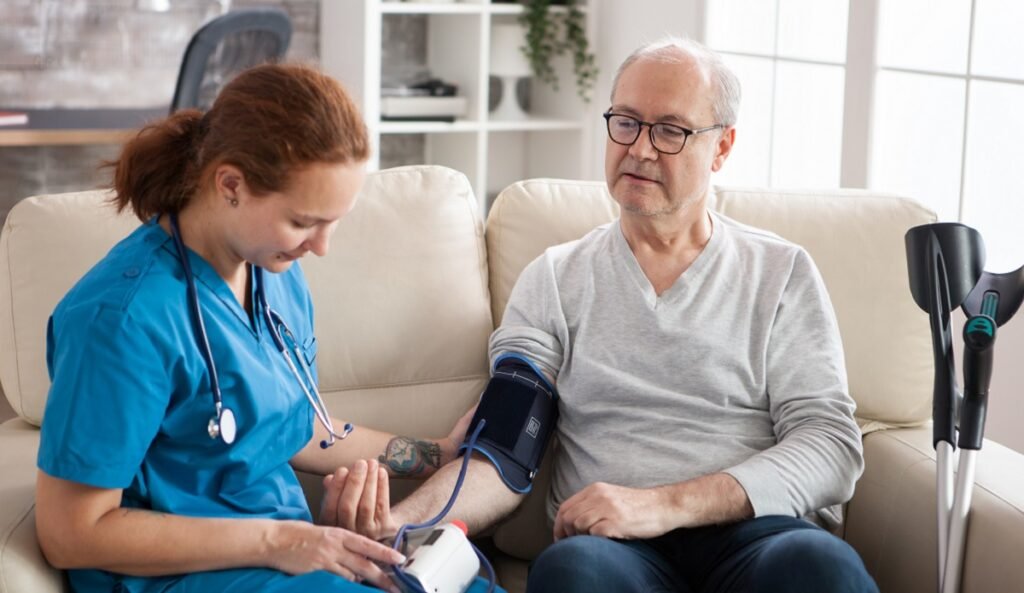Medications have the potential to reduce blood pressure. 10 effective ways to lower your blood pressure is to discuss today. Numerous dietary and lifestyle adjustments, like upping your exercise, getting more sleep, and cutting back on alcohol and sugar, may also be beneficial. Though it frequently shows no symptoms, high blood pressure, or hypertension, increases the risk of heart disease and stroke.

The goal blood pressure for most people will be less than 120/80 mm Hg. A person has high blood pressure if their reading is 130/80 mm Hg or higher.
An high blood pressure value falls between 120 and 129 over less than 80. This indicates that high blood pressure is something you could experience. To prevent your blood pressure from rising too high, your doctor could suggest certain lifestyle changes.
10 Effective Ways to Lower Your Blood Pressure
1. Enough Exercise
Studies indicate that blood pressure can be regulated or delayed by aerobic and resistance exercise, and that the effects of exercise can cause blood pressure to drop for up to 24 hours.
Frequent activity causes your respiration and heart rates to rise on a regular basis. With time, your heart gets stronger and needs less work to pump. Your blood pressure is lowered and your arteries are under less pressure as a result.
The Centers for Disease Control and Prevention (CDC) advise engaging in moderate-intensity exercise for at least 2.5 hours a week, or roughly half an hour every day, five days a week. The CDC recommends one hour of exercise every day for kids and teenagers.
2. Control Weight
The heart and circulatory system are strained by carrying extra body weight.
You can lower your blood pressure if you lose 5 to 10 pounds if your body mass index (BMI) is 25 or above. It can lessen the chance of developing additional health issues.
3. Reduce Intake Sugar & Refined Carbs
Cutting less on sugar and processed carbohydrates may help lower blood pressure and promote weight loss.
A 2020 study examined the effects of popular diets on weight and cardiovascular risk in individuals.
Following low-carb and low-fat diets, obese or overweight individuals experienced an average drop in diastolic blood pressure of about 5 mm Hg and a reduction in systolic blood pressure of 3 mm Hg after six months.
4. More Potassium, Less Salt
Lowering your blood pressure can be achieved by eating less salt and more potassium. Consuming more salt can raise blood pressure risks, whereas consuming less salt lowers them. Experts are unsure of the precise source of this, although possible causes include blood vessel inflammation and water retention.
Potassium relaxes blood vessel tension and aids in the body’s salt elimination.
Foods High In Potassium Include:
Dried Fruit, like Prunes and Apricots,
Milk, and yogurt
Veggies including potatoes, tomatoes, and spinach; lentils and kidney beans
However, individuals with kidney illness may experience negative effects from high potassium intake, so consult your doctor before making any dietary changes.
You may choose which items to eat and which to avoid by consulting nutrition labels. A salt listing of 5% is deemed low by the Food and Drug Administration (FDA), whereas a listing of 20% or higher is deemed high.
5. Heart-Healthy Diet
The Dietary Approaches to Stop Hypertension, or DASH, is a heart-healthy recommendation from the National Institutes of Health.
A focus of the DASH diet is:
Eating whole fruits, veggies, and grains
Eating low-fat or fat-free dairy products; eating beans, nuts, chicken, fish, and vegetable oils;
Consuming fewer items heavy in saturated fats and added sugars
6. Limit Processed Food
Processed foods frequently contain large amounts of added sugar, salt, and bad fats. They could cause you to gain weight. Each of these elements has the potential to raise blood pressure.
As examples, consider:
Processed meats
Lots of fried or quick food
Processed munchies
Foods with low fat labels may also be heavy in sugar and salt to offset the fat loss. Food tastes good and fills you up because of fat.
Eating fewer processed foods will help you reduce your intake of sugar, salt, and refined carbohydrates. Lower blood pressure can be the outcome of all of this.
7. Quit Or Avoid Smoking
Your overall health, including your blood pressure, might be negatively impacted by smoking.
The substances found in tobacco can eventually cause blood pressure to rise by:
Injuring the walls of your blood vessels, resulting in inflammation and artery constriction
The hardened arteries cause elevated blood pressure.
Even if you are not directly near secondhand smoke, the chemicals in tobacco can still have an impact on your blood vessels.
According to one study, those without smoking had lower blood pressure in places where there were smoke-free pubs, restaurants, and workplaces than in places where there were no smoke-free regulations.
8. Managing Stress
For the sake of your overall health and blood pressure, it is imperative that you master stress management skills.
Different people find different strategies to decrease stress, some of which include:
Focusing on deep breathing
Strolling, reading
Listening to music
Practicing awareness
Meditation
9. Eat Some Dark Chocolate
70% to 85% cacao is usually found in dark chocolate.
Flavonoids, an antioxidant found in cacao, have the potential to decrease blood pressure. Your blood vessels may get wider or dilate as a result of these flavonoids.
While eating a modest amount of dark chocolate every day is probably not going to be harmful, the American Heart Association does point out that it is unlikely to contain enough flavonoids to have a beneficial effect on health.
Chocolate with a lot of calories, fat, or sugar might not be good for you.
10. Get Quality Sleep
Lack of sleep may make high blood pressure more likely.
Sleeping typically causes a reduction in blood pressure, so that may be one reason. You might not go through this stage if you have trouble falling asleep.
Among the suggestions for sound sleep are:
Establishing a consistent sleep schedule
Exercise during the day, but refrain from doing so just before bed
Sleeping in a cool, dark room, leaving electronics outside the bedroom, and avoiding heavy meals or drinks right before bed.
Conclusion
In summary, proactive blood pressure management through the use of several lifestyle modifications can greatly enhance general cardiovascular health. For those looking to reduce their blood pressure, the 10 practical solutions listed offer a thorough foundation. People can take charge of their blood pressure and lower their risk of issues connected to hypertension by adopting practices including eating a nutritious diet, exercising frequently, managing stress, consuming less alcohol, and placing a high priority on getting enough sleep. Complementary behaviors such as limiting sodium intake, keeping a healthy weight, stopping smoking, consuming coffee in moderation, and thinking about nutritional supplements provide further opportunities for improvement. People can empower themselves to improve their cardiovascular health and live better lives by regularly committing to these lifestyle changes.
